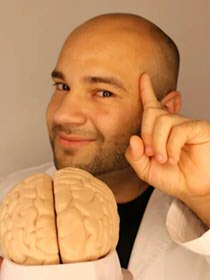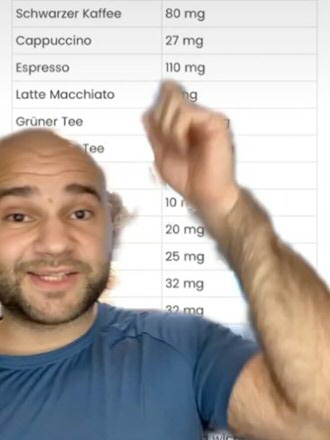Alumnus Etrit Asllani exposes fake news on TikTok
Social media platform TikTok is bursting with fake news. To help young TikTok users distinguish fake news from real news, psychology alumnus Etrit Asllani started the TikTok channel ‘KeinFakeNews’ in 2020. This proved to be a great success. The channel now has a whopping 686,000 followers.

Did you know that spiders crawl into your mouth when you are sleeping? And that another dangerous virus has been discovered in China which is going to cause a new pandemic even worse than the corona pandemic? Oh, and by the way, an asteroid the size of the eiffel tower is hurtling straight towards Earth as we speak. These are just some examples of the fake news that is being spread via the social media platform TikTok.
Fact or fiction
It is the mission of psychology alumnus Etrit Asllani (29) to eliminate this kind of nonsense. In video clips that last about half a minute, he humorously discusses fake news and explains to his viewers what is really going on. His audience consists mainly of young people. For them it can be quite difficult to separate online facts and fiction. Fake news may give them a distorted world view.

Energy drink
Asllani started his channel KeinFakeNews in autumn 2020. Since then, he has posted over 620 videos and has over 686,000 followers and 13.8 million likes. In one of his most popular videos (628,000 views), he responds to an influencer who claims that energy drinks contain "at least five times as much caffeine" as a cup of strong coffee. "Fake news! There are 80 milligrams of caffeine in 100 milliliters of black coffee and 32 milligrams in 100 milliliters of energy drink", Asllani explains while pointing to a nutrition chart.
Online brother
Young people have the reputation of being a hard-to-reach group. But Asllani had no problem in reaching them. Because he speaks ‘their’ language, he has become a kind of online big brother you can go to if you are worried. "Sometimes young people are really scared by fake news. For example, when there seemed to be a carcinogenic substance in Snickers ice creams. Then they tag me and I explain what's going on. In this case, it turned out to be true, but I explained to them that the chances of actually getting sick are very slim."
Critical thinking
When debunking fake news, Asllani says he gains a lot from the knowledge and skills he acquired during his studies in Work, Organizational and Personnel Psychology in Groningen, among others. "Like looking critically at statistics or method sections of scientific articles." His goal is to teach these skills to young people as well so that they can spot fake news themselves. "I want to encourage them to think critically so that they do not need me anymore. They don't learn these kind of things at school even though they are interested in it. It would be great when schools would include this topic in their curriculums as well."
More news
-
20 January 2026
Alcohol, texting, and e-bikes
-
13 January 2026
Lonneke Lenferink joins The Young Academy
-
08 December 2025
Citizen participation essential for a sustainable energy future


